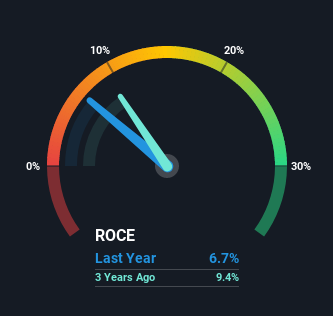Ricegrowers (ASX:SGLLV) Will Be Looking To Turn Around Its Returns
To avoid investing in a business that's in decline, there's a few financial metrics that can provide early indications of aging. Typically, we'll see the trend of both return on capital employed (ROCE) declining and this usually coincides with a decreasing amount of capital employed. This reveals that the company isn't compounding shareholder wealth because returns are falling and its net asset base is shrinking. On that note, looking into Ricegrowers (ASX:SGLLV), we weren't too upbeat about how things were going.
What is Return On Capital Employed (ROCE)?
For those that aren't sure what ROCE is, it measures the amount of pre-tax profits a company can generate from the capital employed in its business. To calculate this metric for Ricegrowers, this is the formula:
Return on Capital Employed = Earnings Before Interest and Tax (EBIT) ÷ (Total Assets - Current Liabilities)
0.067 = AU$36m ÷ (AU$739m - AU$208m) (Based on the trailing twelve months to October 2020).
Thus, Ricegrowers has an ROCE of 6.7%. In absolute terms, that's a low return but it's around the Food industry average of 6.2%.
Check out our latest analysis for Ricegrowers

Above you can see how the current ROCE for Ricegrowers compares to its prior returns on capital, but there's only so much you can tell from the past. If you'd like to see what analysts are forecasting going forward, you should check out our free report for Ricegrowers.
What The Trend Of ROCE Can Tell Us
In terms of Ricegrowers' historical ROCE movements, the trend doesn't inspire confidence. About five years ago, returns on capital were 18%, however they're now substantially lower than that as we saw above. And on the capital employed front, the business is utilizing roughly the same amount of capital as it was back then. This combination can be indicative of a mature business that still has areas to deploy capital, but the returns received aren't as high due potentially to new competition or smaller margins. So because these trends aren't typically conducive to creating a multi-bagger, we wouldn't hold our breath on Ricegrowers becoming one if things continue as they have.
On a side note, Ricegrowers has done well to pay down its current liabilities to 28% of total assets. That could partly explain why the ROCE has dropped. Effectively this means their suppliers or short-term creditors are funding less of the business, which reduces some elements of risk. Since the business is basically funding more of its operations with it's own money, you could argue this has made the business less efficient at generating ROCE.
What We Can Learn From Ricegrowers' ROCE
In summary, it's unfortunate that Ricegrowers is generating lower returns from the same amount of capital. Since the stock has skyrocketed 124% over the last five years, it looks like investors have high expectations of the stock. Regardless, we don't feel too comfortable with the fundamentals so we'd be steering clear of this stock for now.
Ricegrowers does have some risks though, and we've spotted 1 warning sign for Ricegrowers that you might be interested in.
While Ricegrowers may not currently earn the highest returns, we've compiled a list of companies that currently earn more than 25% return on equity. Check out this free list here.
If you’re looking to trade Ricegrowers, open an account with the lowest-cost* platform trusted by professionals, Interactive Brokers. Their clients from over 200 countries and territories trade stocks, options, futures, forex, bonds and funds worldwide from a single integrated account. Promoted
New: AI Stock Screener & Alerts
Our new AI Stock Screener scans the market every day to uncover opportunities.
• Dividend Powerhouses (3%+ Yield)
• Undervalued Small Caps with Insider Buying
• High growth Tech and AI Companies
Or build your own from over 50 metrics.
This article by Simply Wall St is general in nature. It does not constitute a recommendation to buy or sell any stock, and does not take account of your objectives, or your financial situation. We aim to bring you long-term focused analysis driven by fundamental data. Note that our analysis may not factor in the latest price-sensitive company announcements or qualitative material. Simply Wall St has no position in any stocks mentioned.
*Interactive Brokers Rated Lowest Cost Broker by StockBrokers.com Annual Online Review 2020
Have feedback on this article? Concerned about the content? Get in touch with us directly. Alternatively, email editorial-team (at) simplywallst.com.
About ASX:SGLLV
Ricegrowers
Operates as a rice food company in Australia, New Zealand, the Pacific Islands, Europe, the Middle East, Africa, Asia, and North America.
Excellent balance sheet, good value and pays a dividend.
Similar Companies
Market Insights
Community Narratives





